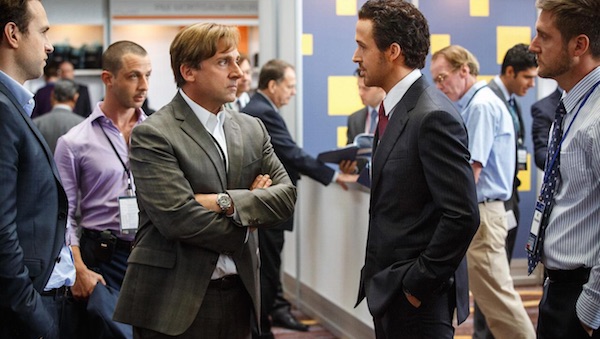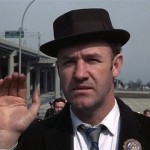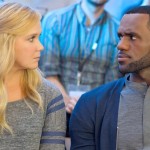The Big Short Review
Adam McKay is a tightrope walker. His latest film, The Big Short, is one of 2015’s funniest offerings. Its subject matter? The 2008 collapse of the American economy.
McKay cut his teeth with Will Ferrell vehicles like Anchorman and Talladega Nights, which are both absurdist comedies with their own internal logics born out of intense stupidity — just like the American banking system! After seeing the insanity that led us to 2008 — information the film relays to us with wit and clarity — it’s not hard to understand why McKay wanted to direct an adaptation of Michael Lewis’ straightforward novel on the same subject, but it doesn’t make the magnitude of his achievement any less impressive or surprising.
The film follows three groups of characters who are working toward similar ends but never cross paths. Michael Burry (Christian Bale) is a former M.D. turned California hedge fund manager. In 2005, he noticed a disturbing trend in the American housing market wherein highly rated mortgage-backed securities were actually full of extremely risky loans that would likely fail. So despite being the laughingstock of every big bank in the country, he bet everything against the market.
When word of Burry’s bet hits the ear of banker Jared Vennett (Ryan Gosling), he wants in, so he approaches Marc Baum (Steve Carell), who runs a hedge fund under the umbrella of Merrill Lynch and shares Vennett’s distrust of the entire financial system. Baum likes the intel, but wants to see if it’s as rock-solid as Vennett makes it seem, so he and his team travel to Florida to visit a housing development full of foreclosed properties to investigate if this market is as bad as it sounds.
Charlie Geller (John Magaro) and Jamie Shipley (Finn Wittrock) are up-and-coming investors who want a seat at the big boys table. After another failed interview, they literally stumble into Vennett’s plan and seek out the advice of a former fund manager and true apocalyptic thinker Ben Rickert (Brad Pitt).
Performance-wise, Christian Bale is a thing to behold. He’s got a glass eye and a stutter, and he sits somewhere on the autism spectrum. We meet Burry during the world’s most uncomfortable job interview, and he has the gall at one down point in the film to inform his fund’s investors that they’re no longer able to take out their money. He’s a real piece of work, but a genius who saw this before anyone else did. Bale’s work will certainly infuriate certain audiences who find his louder style of acting off-putting. Me? Thought he was a joy to behold.
The same goes for the way the film is crafted. McKay brought on cinematographer Barry Ackroyd (The Hurt Locker and Captain Phillips, among other films) to give the film a sense of visual urgency that matches the urgency of its characters and subject matter. More notable are McKay’s many visual and aural asides that really make the film pop. When it’s time to explain a complicated financial term, say hello to Margot Robbie in a bathtub! And during a particularly crazy conversation with a banker, McKay adds a laugh track! The Big Short can be a little chaotic, and not everything McKay throws at the wall sticks, but the attempt is gutsy and admirable and makes the entire cinematic package engaging and fun.
Carell is the closest thing this film has to a beating heart (though it’s pretty cynical from start to finish). All of these guys are trying to take advantage of a broken system, but while Vennett, Burry, Charlie, and Jamie want to make some money because they can, Baum and his team want the big banks to burn. The money seems secondary to Baum, especially in the film’s final act, when his Chicken Little way of warning the powers that be is replaced by indignation and demoralization. And while that transition is happening, the film itself moves from one built around laughs to one built around fire-in-its-belly anger.
That’s arguably the film’s and its screenplay’s (McKay, Charles Randolph) best quality because it punches you in the gut after lulling you into thinking it wasn’t quite that ambitious or serious about its subject matter. In that respect, it’s the closest we’ll probably ever come to a film replicating The Daily Show, and that’s meant in the best way possible. It points out how absurd an important American institution is before asking you the viewer why you’re not more upset about its utter failure. The Big Short isn’t as unhappy with you as it is with the banks, rating agencies, or government, but it’s close. It’s such a blustery movie, but it ends with the most fiercely clear way possible, saying, “This happened. We all did this, and we said it was OK. Isn’t. That. Fucked. Up?”
















One Response to The Big Short Review